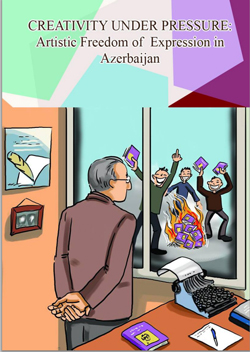4 Aug 2014 | Azerbaijan, Azerbaijan News, Europe and Central Asia, News and features
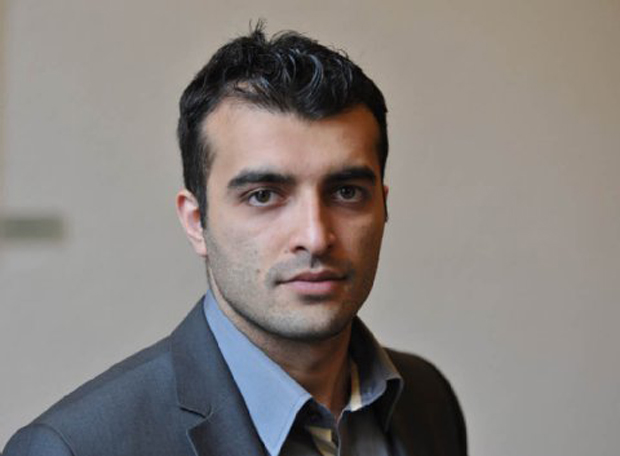
(Photo: National Endowment for Democracy)
Azerbaijani human rights activist Rasul Jafarov has been charged with tax evasion, illegal entrepreneurship and power abuse and sentenced to three months of pre-trial detention. Jafarov’s detention follows the arrest last week of Leyla Yunus and the disappearance of the print edition of Azadliq from the streets of Baku. Arif Yunus was put under a three month pretrial detention on 5 Aug.
Jafarov, an Index contributor, is a prominent campaigner and critic of Azerbaijan’s government, led by President Ilham Aliyev. He has worked on putting together a detailed list of the country’s some 140 political prisoners and was one of the organisers behind the Sing for Democracy campaign, in connection with the 2012 Eurovision final in Baku. He was charged with three articles of the Penal Code by Rasul Nasimi district court in the capital Baku, following interrogation at the Prosecutor General’s office. Last week he was handed down a travel ban.
His arrest comes days after fellow human rights defenders Leyla Yunus and her husband Arif were charged with crimes including high treason. Last week, Azadliq, of the country’s few remaining independent newspapers, was also forced to suspend publication of its print edition due to financial troubles. The charges against Jafarov are the same as those that in May saw Anar Mammadli, another prominent human rights defender, sentenced to 5.5 years in prison.
The Institute for Reporters’ Freedom and Safety (IRFS), an Azerbaijani press freedom organisation, said Jafarov’s arrest is “part of a dedicated campaign aimed at suspension of activities of unregistered NGOs in Azerbaijan”. Registering NGOs in Azerbaijan is difficult — Jafarov has reportedly attempted to register his organisation Human Rights Club a number of times without success. As a result, many groups operate without a licence.
There has recently been an escalation in the targeting of opposition voices in Azerbaijan, according to IRFS, who say this crackdown has included state-controlled media smear campaign, raids on NGO offices, confiscation of equipment, suspension of NGO bank accounts, and intimidation and legal pursuit of NGO workers.
In May, Azerbaijan assumed chairmanship of the Council of Europe’s Committee of Ministers, whose tasks include “ensure[ing] that member states comply with the judgments and certain decisions of the European Court of Human Rights”.
“Further deterioration of the situation with fundamental rights and freedoms, as well as repressions against the civil society is incompatible with Azerbaijan’s international commitments, especially in light of its current presidency in the Council of Europe,” said the Civic Solidarity Platform, a network of 60 human rights NGOs of the OSCE region, in a statement.
“We know that the charges against those brave human rights defenders are politically motivated. The authorities want to silence those holding the country to its international obligations and commitments, including within the Council of Europe” said Maria Dahle, Executive Director of the Human Rights House Network.
Index Reports: Locking up free expression: Azerbaijan silences critical voices (Oct 2013) | Running Scared: Azerbaijan’s silenced voices (Mar 2012)
An earlier version of this article stated that Arif Yunus had been arrested last week. This was incorrect. Yunus was arrested on 5 Aug and sentenced to a three month pretrial detention.
This article was posted on August 4, 2014 at indexoncensorship.org
12 May 2014 | Azerbaijan, Azerbaijan News, Campaigns
As Azerbaijan is about to assume the Chairmanship of the Council of Europe Committee of Ministers, a new report details cases of violations of the right to artistic freedom of expression over the past three years in the country.
According to the report, the Azerbaijani authorities have used a range of tactics to silence critical artistic expression, including harassment, intimidation, threats, interference, legal pressure, arrest, imprisonment, and torture.
The report, Creativity Under Pressure: Artistic Freedom of Expression in Azerbaijan, is published by the Baku-based Art for Democracy campaign. Art for Democracy is a campaign that uses art to promote democracy and human rights in Azerbaijan. The group has faced significant pressure since its launch in December 2012, including the attempted launch event for this very report, which has been cancelled by three hotels in Baku.
Index on Censorship is posting the report on its website as Art for Democracy’s new website, www.artfordemocracy.net, has faced a hack attack shortly after being live and is not currently functioning.
Executive Summary
Creativity Under Pressure: Artistic Freedom of Expression in Azerbaijan (PDF) is a report of the Art for Democracy campaign, which uses all forms of artistic expression to promote democracy and human rights in Azerbaijan. The report examines the situation of artistic freedom of expression in Azerbaijan from 2011 to the time of publication, April 2014.
Despite the fact that Azerbaijan has committed to respect and protect the right to artistic freedom of expression, in practice, the Azerbaijani authorities restrict this right, particularly with regard to alternative artists and artists considered to be critical of the government. The ability of these artists to perform, display, or disseminate their work is limited through direct and indirect means. As a result, few artists remain willing to publicly express critical views or use their work to explore controversial themes, and those who do face serious consequences.
The report is divided into three chapters. The first chapter sets out international standards for artistic freedom of expression, which Azerbaijan has committed to protect and respect through its membership in a number of international organizations and its ratification of or accession to international treaties.
The second chapter covers the domestic legal framework for artistic freedom of expression. Azerbaijani legislation largely conforms to international standards for artistic freedom of expression; however, many of these laws allow for state interference, which could be used as means of censoring artistic expression. Further, the continued presence of criminal defamation provisions in Azerbaijani legislation contradicts international standards and has a chilling effect on freedom of expression, contributing to widespread practices of self-censorship in the country, including in the arts.
The third chapter examines freedom of artistic expression in practice in Azerbaijan, detailing cases of pressure on musicians; film, television, and theater workers; writers, poets, and publishers; human rights defenders who campaign for the right to artistic freedom of expression or who use artistic forms of expression to draw attention to the human rights situation in Azerbaijan; and political activists who use creative means of expressing critical political views.
In publishing this report, the Art for Democracy campaign hopes to draw greater awareness, both within Azerbaijan and at the international level, to ongoing restrictions of the right to artistic freedom of expression in Azerbaijan, and in that regard, to improve the situation in the country.
To that end, the report contains a number of recommendations to the Azerbaijani authorities for concrete steps needed to improve the situation of artistic freedom of expression in the country. Among these are the need to cease politically motivated arrests of persons in connection with their exercise of the right to artistic freedom of expression; to conduct serious and independent investigations into reports of torture and calls for violence against artists; to cease practices of censorship and dismissal of artists working for state bodies; to cease practices of discriminatory treatment of critical and alternative artists; and to decriminalize defamation.
Read the full report here (PDF)
This article was published on May 12, 2014 at indexoncensorship.org
28 Jan 2014 | Azerbaijan, Azerbaijan News, News and features, Religion and Culture
Azerbaijani campaigners have called on their government to refrain from preventing public events amid claims the country’s authorities recently blocked the screening of a documentary on freedom of artistic expression.
“Art claims democracy” was set to run at the Park Inn Hotel, Baku, on January 24 as part of the Art for Democracy campaign; a suspicious power cut halted all activity.
The power outage was limited only to the second floor of the building, the floor on which the documentary film was to be aired. Organisers confronted hotel staff at the time who informed them of a technical problem. According to Art for Democracy some hotel employees later unofficially admitted the power shortage was a result of pressures on the hotel management.
A public statement was published by Art for Democracy in-light of the incident: “Prevention of the screening of a film, which features critical opinions about several top ranking officials including Azerbaijan’s President Ilham Aliyev, could have been organised by no one except law-enforcement agencies under the instructions of high-ranking officials. By taking this step, the government attempted to make the hotel, a private enterprise, and civil society representatives to confront each other.”
The campaign stated the Azerbaijani government needs to be weary of preventing such events and to respect human rights, emphasising how such restrictions only reflect badly the international image of the country.
This article was posted on 28 January 2014 at indexoncensorship.org
9 Oct 2013 | Azerbaijan, Azerbaijan News, News and features, Volume 42.03 Autumn 2013
In the run up to today’s Azerbaijani presidential election, we publish an article and photographs from Index on Censorship magazine showing how the authorities have cracked down on journalists, activists and artists that criticize the government. These stories of the risks journalist and photographers face show how far the regime will go to silence its critics including intimidation and prison sentences. Writers Rasul Jafarov and Rebecca Vincent document the stories of some of the country’s courageous photojournalists, who have documented what life is really like under President Ilham Aliyev.
“In authoritarian regimes, art can serve as a powerful means of expressing criticism and dissent, subverting traditional means of censorship. Photography is particularly telling, capturing the raw truth and making it difficult for even seasoned propagandists to refute. These photographs, from Abbas Atilay, Shahla Sultanova, Mehman Huseynov, Aziz Karimov, Ahmed Muxtar and Jahangir Yusif, show a side of the capital Baku that contrasts sharply with the sleek, glossy image President Ilham Aliyev’s government seeks to portray. They expose an authoritarian regime prepared to arrest those who document protests and criticism — journalists, human rights defenders, civic and political activists and even ordinary citizens.
But those who embrace subjects others prefer to avoid, exposing unsavoury truths the Azerbaijani authorities would prefer to keep hidden — such as corruption and human rights abuses — do so at significant personal risk and hardship.
As journalists, they face intimidation, harassment, threats, blackmail, attacks and imprisonment in connection with their work, which is seen as direct criticism of the authorities. As artists, they face economic hardship and restrictions on where they can display and disseminate their work.
Most of these images were taken during unsanctioned protests in Baku. Photographers face particular hazards when covering protests in Azerbaijan, as not only can they be injured in the general chaos, but they can also be singled out because of their work. The Institute for Reporters’ Freedom and Safety reports that so far in 2013 there have been 17 attacks against journalists and photographers covering protests.
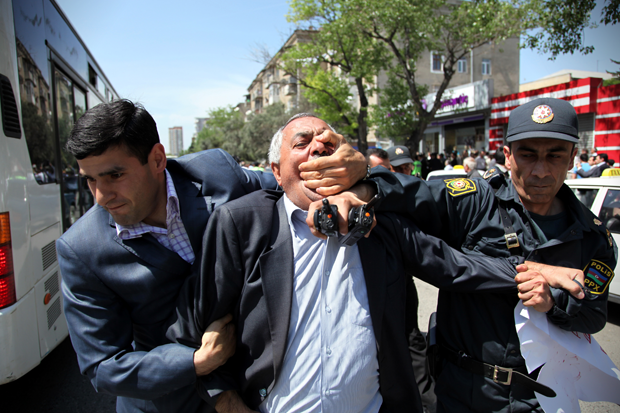
Narimanov Park, Baku, 15 May 2010. Police forcibly detain a political activist during an unsanctioned protest. Photograph by Abbas Atilay
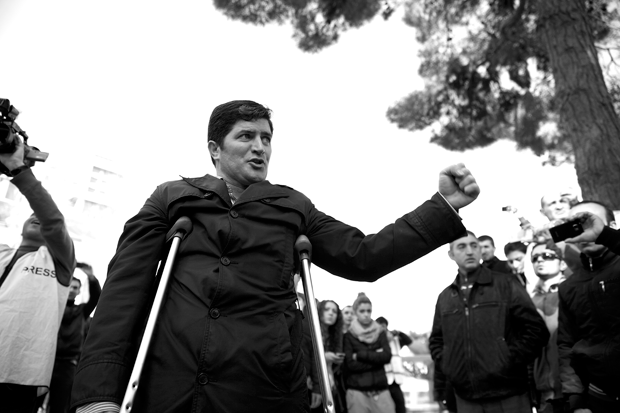
Fountain Square, Baku, 10 March 2013. A political activist during an unsanctioned demonstration protesting the deaths of military conscripts in non-combat situations. Authorities used excessive force to disperse the peaceful protest and detained more than 100 people. Photograph by Jahangir Yusif
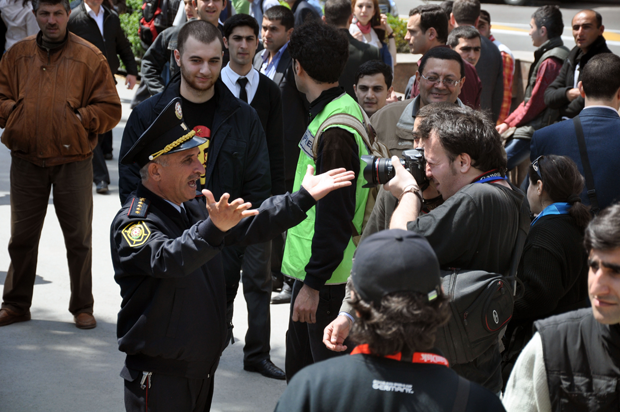
Sabir Park, Baku, 11 March 2011. During an unsanctioned political protest
in the wake of the Arab Spring, a police officer encourages journalists to take his photo. This was a rare move, which the photographer believes was intended to distract photographers from other aspects of the protest, such as police physically restraining protesters. Photograph by Mehman Huseynov
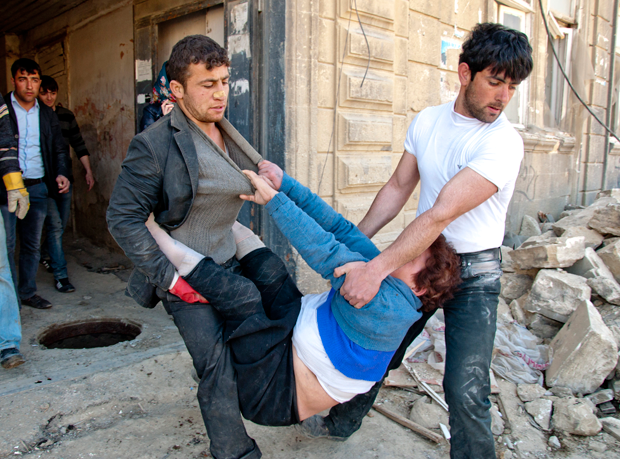
Shamsi Badalbayli Street, Baku, 2 April 2012. A resident is forcibly evicted from the area where the Winter Garden will be constructed. Approximately 300 complaints have been sent to the European Court of Human Rights related to forced evictions from this area. Photograph by Ahmed Muxtar
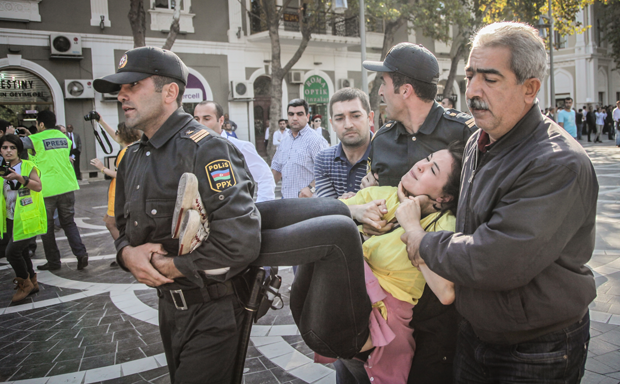
Fountain Square, Baku, 20 October 2012. Police detain a young opposition activist during an unsanctioned protest calling for parliament to be dissolved after a video was released showing an MP discussing the sale of parliamentary seats. Dozens of activists were detained during that protest. Photograph by Aziz Karimov
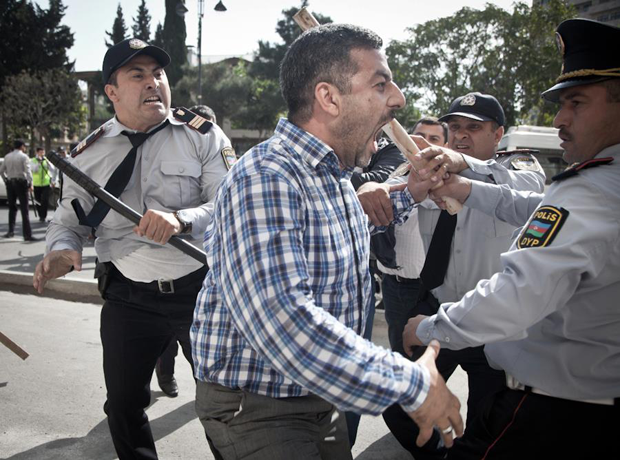
Hijab ban, 5 October 2013. Photograph by Aziz Karimov
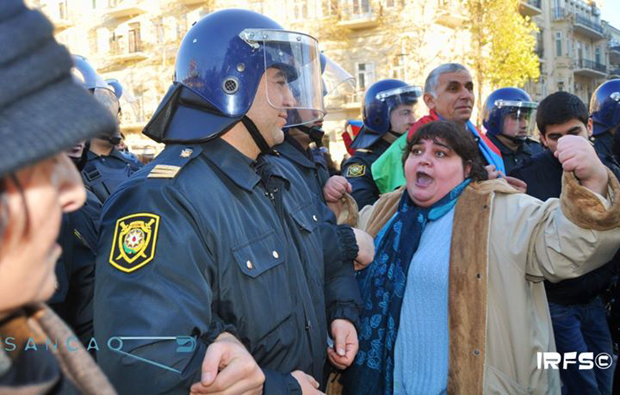
Investigative journalist Khadija Ismayilova confronts police. Photograph by Mehman Huseynov
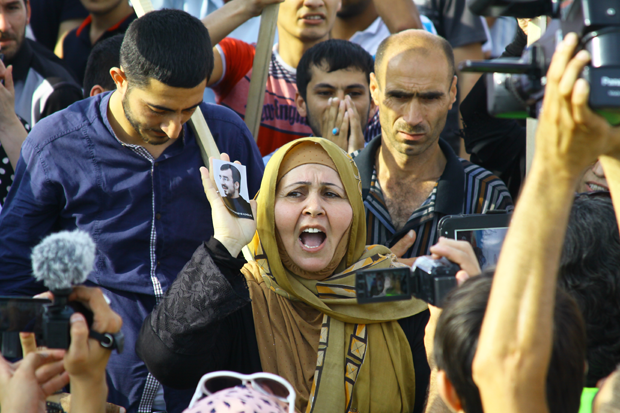
Nevreste Ibrahomova, head of Azerbaijan Islamic Party’s Women Council, holds the photo of an arrested Azerbaijani Islamist and chants freedom to him. Photograph by Shahla Sultanova
Photographers also face arrest and protracted legal action as a result of their work. Mehman Huseynov faces up to five years in prison on politically motivated hooliganism charges stemming from an altercation with a police officer during protests ahead of the Eurovision Song Contest in May 2012. The photographers featured in this story are among the few courageous individuals in Azerbaijan who remain willing to take on the risks associated with this work. They need international support and protection before they, too, become the subjects rather than the artists.”
Rasul Jafarov is the chairman of the Human Rights Club and project coordinator of the Art for Democracy Campaign. Rebecca Vincent is Art for Democracy’s advocacy director. She writes regularly on human rights issues in Azerbaijan
To find out more about the magazine and for subscription options, and read more about stories from the issue click here. These photographers will be part of an exhibition in London this winter. For more details, follow @art4democracy Join us to launch of Index on Censorship’s autumn issue on 15 October. To register for the event, click here.


